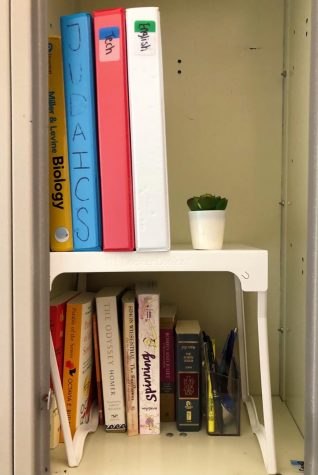Organization: It’s a Personal Thing.
December 15, 2021
Staying organized is a vital life skill, yet organizational struggles are not uncommon. They are challenges that most students, even overachievers, face at some point in their academic careers. Tamera Sell, the learning support specialist at The Emery/Weiner Middle School, has spent 31 years of her career helping students learn study skills to bolster their educational performance. She explains that in regards to organization, the key is “having a system that works for you.”
As a learning support specialist, Sell teaches effective study methods and explains how the developing brain processes information. She uses the example of the cell phone. When students see a text message while doing their homework, it can take 10 minutes to refocus their attention. Sell explains, “by sharing this information, I can explain why students should put away their phones when they study, instead of just telling them to do so without context.” In addition, while sharing effective study practices, Sell claims that teaching organizational methods are critical.
Sell works with a team of 6th-grade teachers to develop organizational methods for students that teachers can promote in their classes. Sell believes it is crucial to start learning organization at a young age because students must practice organization over time. Even “the top students can benefit from organizational skills,” Sell explains. For this reason, she regularly works with students with a wide range of academic abilities. The tools they learn in middle school will be reinforced into high school and will “really come in handy in college and later in life.”
Due to Sell’s work, students at EWS begin practicing organization in middle school and continue through their graduation.

Rachel Gittleman, a senior and the Vice President of the EWS National Honor Society, excels academically due to her organizational methods. Gittleman is a firm believer that organization leads to success. One of her most significant takeaways from Mrs. Sell is the importance of using a planner, as Gittleman feels this tool creates a “sense of accomplishment and motivation” by checking items off her daily to-do list. Especially as an upperclassman, Gittleman’s planner “is crucial to stay on top of her busy schedule.” With college essays, work, and volleyball, Gittleman claims it is vital to have one spot where she can manage her time and know her time constraints before the week begins. Coming into high school, Gittleman would highly recommend that everyone starts using a planner early in their high school career.
For the students who fail to implement sorting strategies, Sell notices a higher number of missing assignments. What can also be detrimental is “not having the right resources”, such as misplaced class notes, which can lead to poor studying strategies and lower grades. Another prominent consequence of disorganization is that “teachers won’t think you care.” Sell finds this extremely unfortunate, as a “big part of being successful in school is advocating for yourself” and having a productive relationship with your teacher. For those who are not turning in assignments, Sell explains it is very difficult for teachers to know if the student is “blowing it off” or simply “a hot mess.” However, most of the time Sell understands that “it can be a little bit of both.”
While students who practice organization experience many advantages, Gittleman and Sell warn that too much organization can also be harmful. Sell has had several students over the years who get so caught up in the details of a task that the amount of time they are spending is “just out of line.” These perfectionist tendencies cause a lot of stress, especially for anxious students that struggle to prioritize their time. Because of this, Sell believes we should teach students that “we want to do our best, but sometimes good enough is okay.” Gittleman concurs with Sell, explaining that “your whole life can’t be organization and school.” Gittleman explains that as humans, it is natural for students to mess up, make mistakes, or forget to do their homework; after all, “that is how students learn.” Gittleman thinks that a lot of students are perfectionists, including herself, and that creates a feeling of obligation “to be so perfect, so organized, and it creates a level of insanity that one shouldn’t reach.”
According to Sell, organization is about creating a balance and “finding the right methods that are best suited for you.” Sometimes students are not clear on what strategies work for them; they look for expedient processes that are harmful in the long run. When students figure out an organizational system that fits their lifestyle, they will be more prepared for what is to come, both in their educational and professional careers. Organization is a skill, “a personal thing,” to be learned, practiced and executed for life.